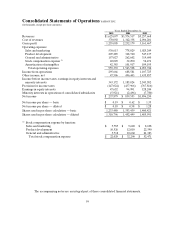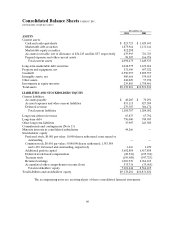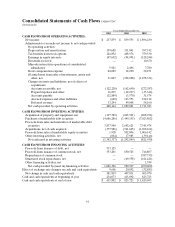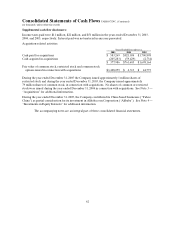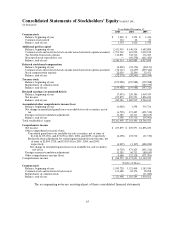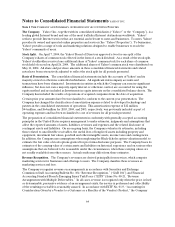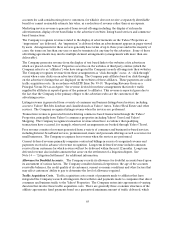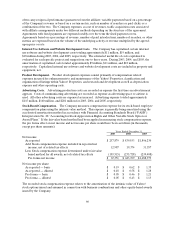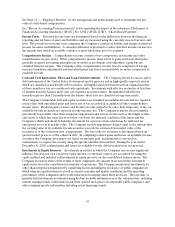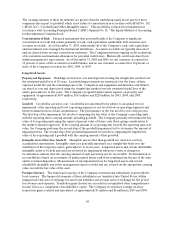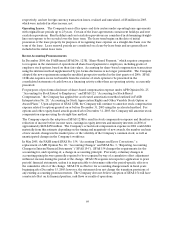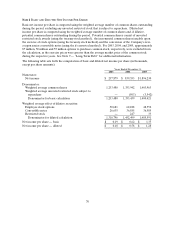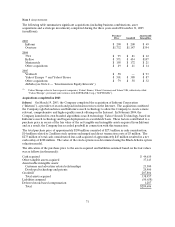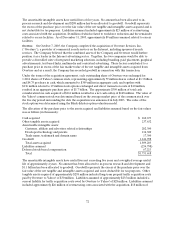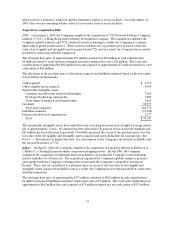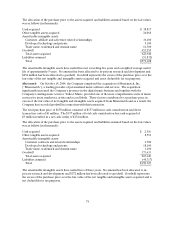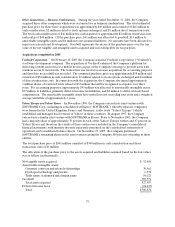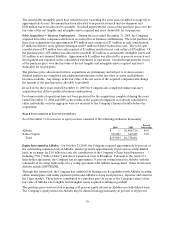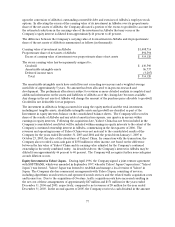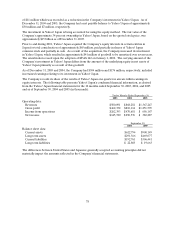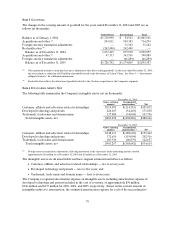Yahoo 2005 Annual Report Download - page 75
Download and view the complete annual report
Please find page 75 of the 2005 Yahoo annual report below. You can navigate through the pages in the report by either clicking on the pages listed below, or by using the keyword search tool below to find specific information within the annual report.69
respectively, and net foreign currency transaction losses, realized and unrealized, of $8 million in 2005,
which were included in other income, net.
Operating Leases. The Company leases office space and data centers under operating lease agreements
with original lease periods up to 23 years. Certain of the lease agreements contain rent holidays and rent
escalation provisions. Rent holidays and rent escalation provisions are considered in determining straight-
line rent expense to be recorded over the lease term. The lease term begins on the date of initial
possession of the lease property for purposes of recognizing lease expense on a straight-line basis over the
term of the lease. Lease renewal periods are considered on a lease-by-lease basis and are generally not
included in the initial lease term.
Recent Accounting Pronouncements
In December 2004, the FASB issued SFAS No. 123R, “Share-Based Payment,” which requires companies
to recognize in the statement of operations all share-based payments to employees, including grants of
employee stock options, based on their fair values. Accounting for share-based compensation transactions
using the intrinsic method supplemented by pro forma disclosures is no longer permissible. The Company
adopted the new requirements using the modified prospective method in the first quarter of 2006. SFAS
123R also requires excess tax benefits from the exercise of stock options to be presented in the
consolidated statements of cash flows as a financing activity rather than an operating activity, as currently
presented.
For purposes of pro forma disclosure of share-based compensation expense under APB Opinion No. 25,
“Accounting for Stock Issued to Employees,” and SFAS 123, “Accounting for Stock-Based
Compensation,” the Company has applied the accelerated amortization method outlined in FASB
Interpretation No. 28, “Accounting for Stock Appreciation Rights and Other Variable Stock Option or
Award Plans.” Upon adoption of SFAS 123R, the Company will continue to amortize stock compensation
expense related to options granted on or before December 31, 2005 using the accelerated method. For
options and other equity-based awards granted after December 31, 2005, the Company will amortize stock
compensation expense using the straight-line method.
The Company expects the adoption of SFAS 123R to result in stock compensation expense and therefore a
reduction of income before income taxes, earnings in equity interests and minority interests in 2006 of
approximately $420-$450 million. The Company’s actual stock compensation expense in 2006 could differ
materially from this estimate depending on the timing and magnitude of new awards, the number and mix
of new awards, changes in the market price or the volatility of the Company’s common stock, as well as
unanticipated changes in the Company’s workforce.
In May 2005, the FASB issued SFAS No. 154, “Accounting Changes and Error Corrections,” a
replacement of APB Opinion No. 20, “Accounting Changes” and SFAS No. 3, “Reporting Accounting
Changes in Interim Financial Statements” (“SFAS 154”). SFAS 154 changes the requirements for the
accounting for, and reporting of, a change in accounting principle. Previously, voluntary changes in
accounting principles were generally required to be recognized by way of a cumulative effect adjustment
within net income during the period of the change. SFAS 154 requires retrospective application to prior
periods’ financial statements, unless it is impracticable to determine either the period-specific effects or
the cumulative effect of the change. SFAS 154 is effective for accounting changes made in fiscal years
beginning after December 15, 2005; however, the statement does not change the transition provisions of
any existing accounting pronouncements. The Company does not believe adoption of SFAS 154 will have
a material effect on its financial position, cash flows or results of operations.


